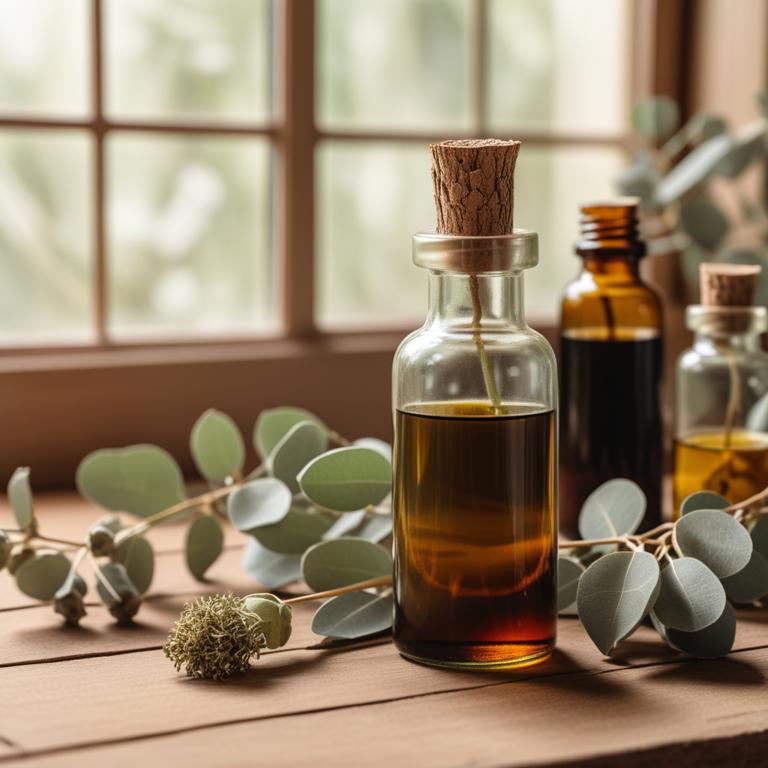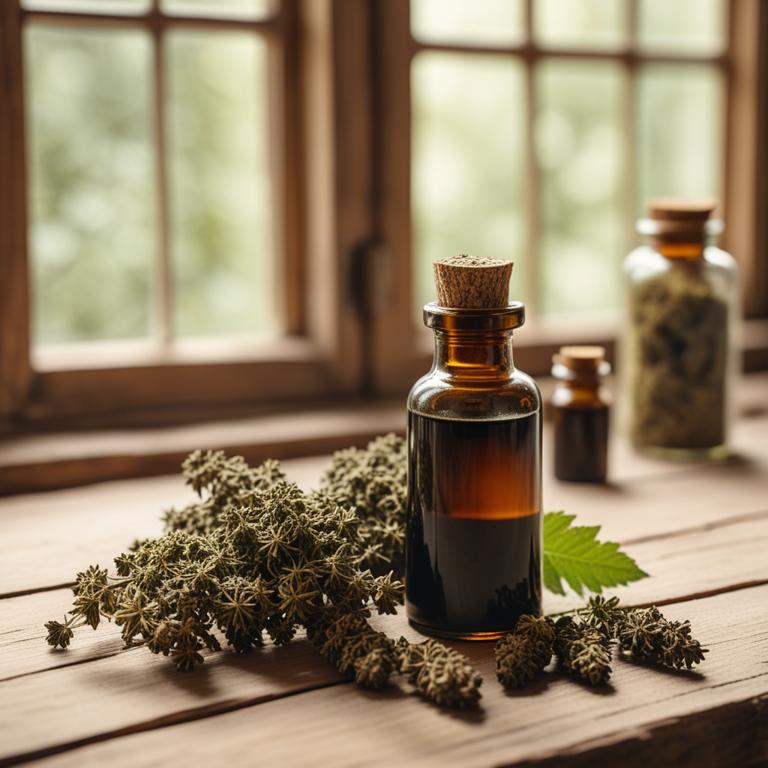9 Best Herbal Tinctures For Sinusitis

Herbal tinctures for Sinusitis are liquid extracts made from various herbs, plants, and flowers, which are often used to treat sinusitis, a common condition characterized by inflammation and congestion in the nasal passages and sinuses.
These herbal tinctures have numerous benefits, including reducing inflammation, fighting off infections, and loosening mucus, making them an effective natural remedy for sinusitis sufferers.
Examples of herbal tinctures commonly used to treat sinusitis include Echinacea tincture, which helps to boost the immune system and fight off infections, Ginger tincture, which reduces inflammation and congestion, and Peppermint tincture, which helps to loosen mucus and ease sinus pressure.
Additionally, other herbal tinctures such as Eucalyptus, Thyme, and Oregano can also be used to treat sinusitis due to their decongestant and antibacterial properties, while Licorice root tincture helps to soothe and calm the respiratory system.
According to "Turkish archives of otorhinolaryngology", tinctures for sinusitis may be a safe and effective treatment option as an alternative to intranasal corticosteroid spray therapy, such as mometasone furoate nasal spray, as suggested by the findings of a study on Sinulan forte.
Below there's a list of the 9 best herbal tinctures for sinusitis.
- 1. Echinacea purpurea tinctures
- 2. Eucalyptus globulus tinctures
- 3. Echinacea angustifolia tinctures
- 4. Ginkgo biloba tinctures
- 5. Zingiber officinale tinctures
- 6. Cinchona officinalis tinctures
- 7. Verbena officinalis tinctures
- 8. Sambucus nigra tinctures
- 9. Glycyrrhiza glabra tinctures
Also you may be interested in...
TODAY'S FREE BOUNDLE
Herb Drying Checklist + Herbal Tea Shopping List + Medicinal Herbs Flashcards
Enter you best email address below to receive this bundle (3 product valued $19.95) for FREE + exclusive access to The Aphotecary Letter.
$19.95 -> $0.00
1. Echinacea purpurea tinctures

Echinacea purpurea tinctures have been used traditionally to treat sinusitis, an inflammatory condition affecting the sinuses.
The antiviral, anti-inflammatory, and immunomodulatory properties of this herbal preparation help to alleviate sinusitis symptoms by reducing inflammation, modulating the immune system, and combating viral infections.
The bioactive constituents present in Echinacea purpurea tinctures, including alkylamides, caffeic acid derivatives, and phenolic acids, contribute to its therapeutic effects by inhibiting pro-inflammatory mediators and enhancing the body's natural defense mechanisms.
By utilizing Echinacea purpurea tinctures, individuals can experience benefits such as reduced congestion, improved respiratory function, and faster recovery from sinusitis, highlighting the potential value of this herbal preparation as a complementary treatment option.
Related Study
According to "The Cochrane database of systematic reviews", Echinacea purpurea tinctures may be better than a placebo in treating sinusitis, but there is not enough evidence to recommend a specific product or preparation for this use.
2. Eucalyptus globulus tinctures

Eucalyptus globulus tinctures have been traditionally used to treat sinusitis, an inflammatory condition of the nasal passages and sinuses.
The antiviral and anti-inflammatory properties of this herbal preparation help to reduce congestion and inflammation, alleviating symptoms such as nasal discharge and facial pain.
The bioactive constituents, including eucalyptol and cineole, exhibit expectorant and bronchodilatory effects, which aid in loosening and removing mucus, promoting easier breathing.
By using Eucalyptus globulus tinctures, individuals can experience relief from sinusitis symptoms, including improved respiratory function and reduced discomfort.
Related Study
According to "Turkish archives of otorhinolaryptology", Eucalyptus globulus tinctures, which are part of the Sinulan forte preparation, have shown to be a safe and effective treatment for acute postviral rhinosinusitis, with significantly lower symptom scores and better quality-of-life outcomes compared to mometasone furoate nasal spray.
3. Echinacea angustifolia tinctures

Echinacea angustifolia tinctures have been used to treat sinusitis due to their anti-inflammatory and immunomodulatory properties.
These properties help to reduce inflammation and alleviate congestion in the nasal passages, providing relief from the symptoms of sinusitis.
The bioactive constituents of Echinacea angustifolia, including alkylamides and glycosides, have been shown to inhibit the production of pro-inflammatory cytokines and promote the production of anti-inflammatory cytokines, which helps to treat this ailment.
The benefits of using Echinacea angustifolia tinctures to treat sinusitis include reduced severity and duration of symptoms, improved quality of life, and a reduced reliance on conventional medications.
Related Study
According to "Turkish archives of otorhinolaryngology", Echinacea angustifolia tinctures, as part of the Sinulan forte preparation, showed significant effectiveness in treating acute postviral rhinosinusitis by reducing total symptom scores, nasal congestion, facial pain, and loss of sense of smell, with no adverse effects reported.
4. Ginkgo biloba tinctures

Ginkgo biloba tinctures have been traditionally used to treat sinusitis due to their anti-inflammatory and antioxidant properties, which help to reduce inflammation and alleviate symptoms associated with this condition.
The bioactive constituents of Ginkgo biloba, including flavonoids and bilobalide, work synergistically to inhibit the production of pro-inflammatory cytokines and enzymes, thereby providing relief from sinus pressure and congestion.
Regular use of Ginkgo biloba tinctures has been shown to help open up airways, improve respiratory function, and reduce the severity of sinusitis symptoms, making it an effective natural remedy for this common ailment.
Furthermore, the benefits of using Ginkgo biloba tinctures to treat sinusitis include reduced reliance on antibiotics and other pharmaceuticals, lower risk of side effects, and improved overall respiratory health.
5. Zingiber officinale tinctures

Zingiber officinale tinctures, derived from the rhizomes of the ginger plant, have been traditionally used to treat sinusitis due to their anti-inflammatory and expectorant properties.
These properties help to reduce swelling and congestion in the nasal passages, making it easier to breathe and expel mucus.
The bioactive constituents, including gingerols and shogaols, have been shown to exhibit antimicrobial and analgesic effects, further aiding in the relief of sinusitis symptoms.
By using Zingiber officinale tinctures, individuals can experience the benefits of reduced sinus pressure, improved respiratory function, and a shorter duration of illness.
Related Study
According to Turkish archives of otorhinolaryngology, Zingiber officinale tinctures, as part of the Sinulan forte herbal preparation, showed significantly lower absolute post-treatment scores and better relative improvement in symptoms such as nasal congestion, facial pain, and loss of the sense of smell, with no adverse effects reported.
6. Cinchona officinalis tinctures

Cinchona officinalis tinctures have been traditionally used to treat sinusitis due to their anti-inflammatory and antimicrobial properties, which help to alleviate symptoms such as congestion and sinus pressure.
The bioactive constituents, including quinine and alkaloids, in this herbal preparation have been found to possess antiseptic and decongestant properties, thereby reducing inflammation and killing bacteria that cause sinus infections.
By using Cinchona officinalis tinctures, patients can benefit from improved respiratory function, reduced sinus pressure, and a decrease in the severity of symptoms associated with sinusitis.
Regular use of this herbal preparation may also help to prevent future sinus infections and promote overall respiratory health.
7. Verbena officinalis tinctures

Verbena officinalis tinctures have been traditionally used to treat sinusitis due to their anti-inflammatory and antimicrobial properties, which help to reduce congestion and combat infections.
The bioactive constituents present in Verbena officinalis tinctures, including flavonoids, phenolic acids, and terpenoids, contribute to its therapeutic effects by modulating the immune system and reducing inflammation.
By using Verbena officinalis tinctures, individuals can experience relief from sinusitis symptoms such as nasal congestion, facial pain, and headaches, ultimately improving their quality of life.
The benefits of using Verbena officinalis tinctures to treat sinusitis include a reduction in the severity of symptoms, accelerated recovery, and minimal side effects, making it a promising natural remedy for this common ailment.
Related Study
According to "Turkish archives of otorhinolaryngology", Verbena officinalis tinctures, which are part of the herbal preparation Sinulan forte, can be a safe and effective treatment for acute postviral rhinosinusitis (APRS) with significantly lower absolute post-treatment scores and better relative improvement in various symptoms compared to mometasone furoate nasal spray.
8. Sambucus nigra tinctures

Sambucus nigra tinctures have been traditionally used to treat sinusitis due to their antimicrobial, anti-inflammatory, and mucolytic properties.
These properties help to reduce nasal congestion, alleviate sinus pressure, and promote the clearance of mucus, thereby aiding in the treatment of sinusitis.
The bioactive constituents of Sambucus nigra tinctures, including flavonoids, phenolic acids, and essential oils, possess antioxidant and anti-inflammatory activities that contribute to their therapeutic effects.
By using Sambucus nigra tinctures, individuals with sinusitis may experience relief from symptoms such as congestion, facial pain, and headache.
Related Study
According to "Postgraduate medicine", Sambucus nigra tinctures for sinusitis, as part of the herbal medicinal product BNO 1016, were shown to significantly reduce the Major Symptom Score (MSS) by 1.9 points and the Sino-Nasal Outcome Test 20 (SNOT-20) by 3.5 points in comparison to placebo.
9. Glycyrrhiza glabra tinctures

Glycyrrhiza glabra tinctures have been traditionally used to treat sinusitis, a common respiratory disorder characterized by inflammation and congestion of the nasal passages.
The anti-inflammatory and expectorant properties of this herbal preparation help to reduce swelling and promote the drainage of mucus, thereby alleviating symptoms such as nasal congestion and coughing.
The bioactive constituents of Glycyrrhiza glabra, including glycyrrhizin and flavonoids, have been shown to possess potent anti-inflammatory and antioxidant activities, which contribute to its therapeutic efficacy in treating sinusitis.
The regular use of Glycyrrhiza glabra tinctures may help to alleviate symptoms of sinusitis, promote sinus drainage, and reduce the risk of complications such as bronchitis and pneumonia.
Related Study
According to "Mini reviews in medicinal chemistry", Glycyrrhiza glabra tinctures for sinusitis may exhibit anti-inflammatory activity and inhibit virus growth due to the plant's pharmacological actions, which modulate the immune system and inactivate viruses.